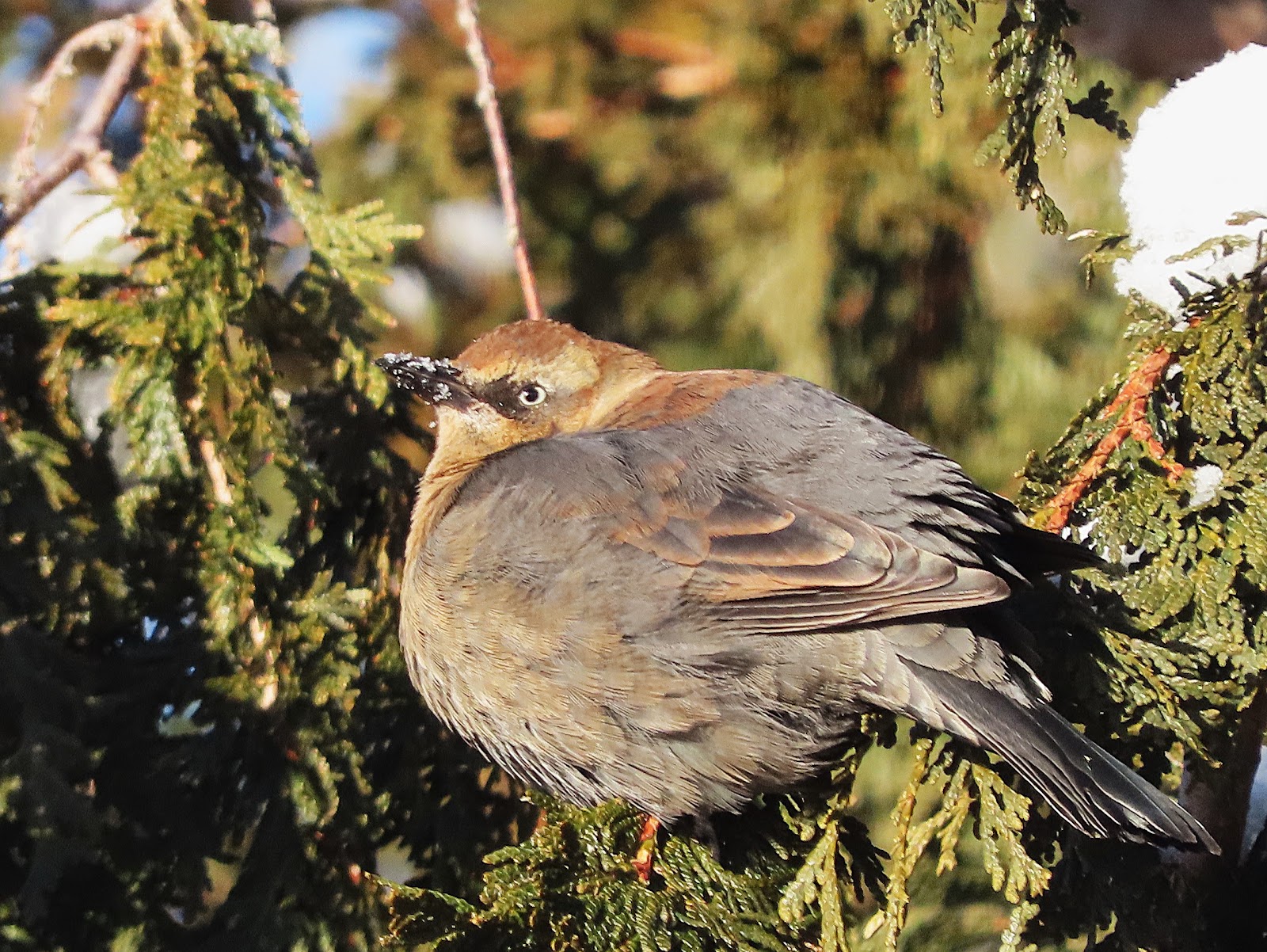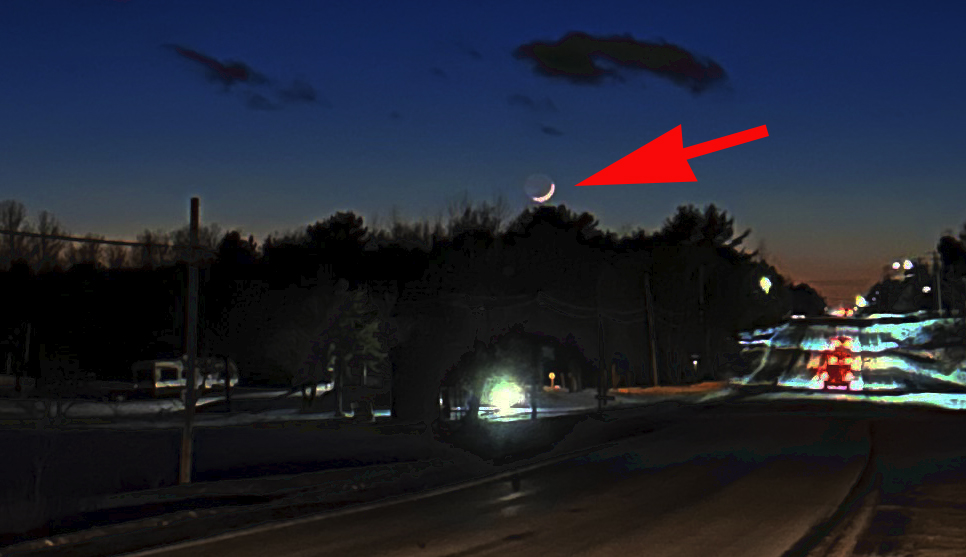NATURE MONCTON NATURE NEWS
January 31, 2025
Nature Moncton members as well as any
naturalist in New Brunswick or beyond are invited to share their photos
and descriptions of recent nature sightings to build a fresh (almost) daily
edition of Nature News
To respond by e-mail, please address your message to the
information line editor, nelsonpoirier435@gmail.com .
Please advise the editor at nelsonpoirier435@gmail.com
and proofreader Louise Nichols at Nicholsl@eastlink.ca if
any errors are noted in wording or photo labelling.
For more information on Nature Moncton, check the website
at www.naturemoncton.com.
Proofreading courtesy of Louise Nichols
**Shannon Inman spotted a Coyote on Thursday. The Inmans comment they are starting to see
more of them in the daytime with the start of mating season.
John Inman notes the darker male Rusty Blackbird has
started singing the last couple of days whereas the female he photographed is
not vocalizing. John also photographed a Dark-eyed Junco sampling the mountain
ash berries, possibly more interested in the seeds than the pulp of the
fruit.
(Editor’s note: seeing more nocturnal animals, such as Red
Foxes and Coyotes, out and about during the day is a seasonal sign that the
days are getting longer and mating time has arrived to prepare for spring
families. Gordon Rattray commented in an earlier edition that he noted darkening on the crown of a male American Goldfinch. John Inman’s comment about the
male Rusty Blackbird vocalizing is yet another indicator that wildlife has
spring in mind. We humans may tend to be hunkering down on these cool days of
January/February but wildlife are plotting their plan.)
**Brian Stone comments that he has heard reports of at
least one large flock of Bohemian Waxwings that were spotted in Riverview as
well as the former Lewisville area of Moncton. There have also been verbal
reports of more American Robins being sighted in Moncton. Hopefully, photos of
the species will be arriving soon to share.
(Editor’s note: one has to wonder if these reports mean
more bird fruit connoisseurs are moving into our area to enjoy the bountiful
supply that we have waiting for them. Here’s hoping the next months will be
filled with observations of contented fruit foraging birds.)
**Nelson Poirier was struck by the waxing crescent Moon
at 5% full as it appeared over the tree line at 6:30 PM on Thursday evening
with the planet Venus shining brightly higher to its left.
Brian Stone points out Saturn is between the Moon and Venus, but doesn't show in Nelson's cell phone photos.
**This Week’s Sky at a Glance, 2025 February 1 – February
8
“Cold wind on the harbour and rain on the road, wet promise of winter brings
recourse to coal.
There’s fire in the blood and a fog on Bras d’Or; the giant will rise with the
Moon.”
(Giant, by Stan Rogers)
By the end of the week the constellation Orion, mythological giant son of
Poseidon, rises with the waxing gibbous Moon. We won’t see the constellation,
of course, until evening twilight dwindles; but watch him become a New York
Giant leaping to catch a lunar football.
When the Moon is full or nearly so amateur astronomers can get a little grumpy
because the moonlight washes out the faint galaxies, nebulae and comets. But
this time of year the waxing gibbous Moon can play a role in some imaginative
stargazing. On Friday evening it is above Orion, looking like a football
approaching his outstretched right hand. Will he catch it in the end zone and
be a hero like Perseus, or miss it and be a goat like Capricornus? With the
Moon in Taurus on Thursday and in the feet of Gemini next Saturday, we also
have a Chicago Bull passing the ball to a Minnesota Twin for an all-star
all-sport soccer game. Is that a lacrosse stick in Orion’s hand?
This Week in the Solar System
Saturday’s sunrise in Moncton is at 7:41 and sunset will occur at 5:24, giving
9 hours, 43 minutes of daylight (7:44 and 5:31 in Saint John). Next Saturday
the Sun will rise at 7:32 and set at 5:35, giving 10 hours, 3 minutes of
daylight (7:35 and 5:42 in Saint John).
The Moon is at first quarter on Wednesday near the Pleiades star
cluster, and it is near Jupiter on Thursday. Saturn sets around 8:30 pm this
weekend, one hour before Venus. Jupiter reaches its second stationary point on
Tuesday, after which it resumes eastward motion against the stars.
Telescope users might see its Red Spot on Monday around 8 pm and Wednesday at
9:30. Mars is slowing its retrograde motion to get a few weeks of rest in the
middle of Gemini. Mercury is too close to the Sun for observing.
As part of the Frostival events, the Fredericton astronomy club will host solar
observing at the Grant Harvey Centre on Sunday from 2 pm to 3 pm. As part of
the Rockwood Park Winterfest, the Saint John Astronomy Club is hosting a
telescope clinic and solar observing between 10 am and 2 pm at the
Interpretation Centre. The club will have its monthly meeting at that location
on February 8 at 7 pm.
Questions? Contact Curt Nason at nasonc@nbnet.nb.ca.
Nelson
Poirier
Nature Moncton






